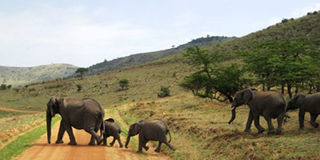Group to block Dar’s Serengeti road appeal

On September 4, Tanzania filed an appeal at the higher Court against the June 20 ruling, arguing that its proposal to upgrade the road could not be challenged in a court of law, not least by EACJ.
What you need to know:
“The First Instance Court further erred by holding that it has powers to grant permanent injuction against any of the partner States under the Treaty”.Principal State Attorney Gabrial P. Malata, who signed the appeal, prayed for the Appellate Division of the EA Court to put aside the judgement.
Arusha. Environmental activists are lining up to block an appeal by the government of Tanzania against a court verdict to stop construction of a paved road across Serengeti National Park.
One of the pressure groups, Serengeti Watch, is pleading for funds from donors and other well wishers abroad to ensure Tanzania does not win its appeal lodged recently at the Appellate Division of the East African Court of Justice (EACJ).
The First Instance Division of the regional Court, in its verdict on June 20 this year, ruled that the planned tarmac road across the famous park would cause ecological damage to the ecosystem which extends to Kenya. It, therefore, further argued in a case filed by a Nairobi-based animal welfare organization that construction of the paved highway was not only unlawful but would also infringe on the East African Community (EAC) Treaty.
On September 4, Tanzania filed an appeal at the higher Court against the June 20 ruling, arguing that its proposal to upgrade the road could not be challenged in a court of law, not least by EACJ.
The Court erred in law and fact by holding that it is proper to enforce Articles 111 to 114 of the EAC Treaty “which are yet to be negotiated, agreed,signed and ratified by all the EAC countries,” the government said. The appeal also charged that the Court erred in law by holding that it has jurisdiction to entertain dispute of the alleged violation of the international conventions on protection of the ecosystems.
The appeal went on; “The First Instance Court further erred by holding that it has powers to grant permanent injuction against any of the partner States under the Treaty”.Principal State Attorney Gabrial P. Malata, who signed the appeal, prayed for the Appellate Division of the EA Court to put aside the judgement.
The acting EAC Registrar, Ms Geraldine Umugwaneza, confirmed that the appeal has been received at the EACJ registry and that it would come up for determination for the first time on Wednesday.
“Lawyers from both sides will come together and determine the issues raised, duration of hearing and set dates for hearing,” said Ms Umugwaneza, who is the Deputy Registrat of the Court.
As the appeal is set for hearing, environmental activists, mainly those based abroad and within the East African region, said they were determined to block the appeal in order to save the Serengeti ecosystem. Mr David Blanton, representing Serengeti Watch, said in a communication to The Citizen on Sunday that at least $ 30,000 was needed to defend the court ruling.
\ against the proposed Serengeti highway.
He said it was a pity that the Tanzanian government had ignored the international scientific community, Unesco World Heritage Centre, the donor governments and the EAC on the controversial road project.
“We are appealing for funds because we feel this is a test case for the EAC. It will ultimately be to the benefit of all EAC members, particularly Tanzania,” he stated, noting that there was a growing concern on the issue.
Mr Blanton added that it would be “a great loss” to the people of Tanzania and Kenya should the (Tanzania) government win the appeal. “However, our efforts to build awareness would continue”.
However, he hinted that there was little the international community can do to Tanzania if the Court ruled in its favour because Tanzania was a sovereign state.
“In that case Tanzania will have the freedom to build the highway,” he explained, noting, however, that the country has obligations to fellow EAC partner states “to manage the shared ecosystems in a wise manner”.
Any ruling that would favour Tanzania, he further argued, would ultimately weaken EAC’s ability to regulate the shared ecosystems that are vital to the region such as the Serengeti which is valued all over the world.
The bone of contention in the legal wrangle has been the planned tarmac road from Loliondo in Arusha region through to Kleins Gate/Tabora B to Mugumu and finally to Natta in Mara region.
The case was filed in December 2010 by the African Network for Animal Welfare (ANAW), a charitable Pan African animal welfare and community-centred organization registered in Kenya.
In its submission ANAW had argued that the proposed highway would have “deleterious environmental and ecological effects” on the delicate Serengeti ecosystem and the adjoining protected areas such as the Maasai-Mara game reserve in Kenya.




